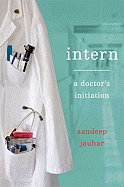

A Berkeley Ph.D. in physics, who considered careers and law and journalism before deciding to follow his brother into medical school, Jauhar embarked on his residency with no small amount of trepidation. "Laymen often view doctors as Type A overachievers with little self-doubt," he writes, and he offers his account to "dispel this myth." What's most striking about the residency experience is the sheer mass of technical information and practical experience young doctors must absorb, while developing the judgment to apply that training to real patients. It's easy to understand why Jauhar writes that he was "constantly afraid."
A prominent theme of Jauhar's memoir is his deep dissatisfaction with the backbreaking schedule medical residents must endure. His description of exhausted interns working 24-hour shifts and 80-hour weeks while handing off an impossible numbers of patients to the next shift on "night float" seems to lay out a recipe for catastrophic mistakes.
During the period Jauhar chronicles, he himself became a consumer of medical services, suffering a herniated cervical disk and slipping toward the edge of a crippling depression. These experiences helped foster in him an empathetic philosophy, one that runs counter to what he describes as the "almost criminal . . . callousness with which we treat some of our patients."
One of the most striking aspects of Jauhar's memoir is the sheer physicality of a doctor's work even in this age of computerized medicine. His graphic accounts of his first attempt to insert an arterial line or of a futile "code," where doctors struggle to revive a patient in cardiac arrest, are harrowing. There's almost a feeling these physicians in training are more mechanics than sophisticated professionals, but Jauhar understands, and reminds us with great sensitivity, that the practice of medicine is a profoundly human endeavor.
Following in the path paved by doctor-writers like Lewis Thomas and Richard Selzer, Jauhar writes with grace, precision and passion. What makes him such a stimulating companion is his willingness to couple candid insights into the state of modern American medicine with equally revealing glimpses into the soul of a young doctor. Even in his current role as a successful Long Island cardiologist, it's not hard to imagine he'll carry the hard-earned lessons of his internship with him for the rest of his professional career.--Harvey Freedenberg

